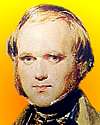 (source)
(source)
|
Charles Darwin
(12 Feb 1809 - 19 Apr 1882)
English naturalist who presented facts to support his theory of the mode of evolution whereby favourable variations would survive which he called 'Natural Selection' or 'Survival of the Fittest.'
|
Charles Darwin Quotes on Animal (22 quotes)
>> Click for 202 Science Quotes by Charles Darwin
>> Click for Charles Darwin Quotes on | Beagle | Biography | Book | Conclusion | Emotion | Evolution | Fact | Geology | God | Human Nature | Man | Mind | Natural Selection | Origin Of Species | Survival Of The Fittest | Truth |
>> Click for 202 Science Quotes by Charles Darwin
>> Click for Charles Darwin Quotes on | Beagle | Biography | Book | Conclusion | Emotion | Evolution | Fact | Geology | God | Human Nature | Man | Mind | Natural Selection | Origin Of Species | Survival Of The Fittest | Truth |
[The root cap of a plant], having the power of directing the movements of the adjoining parts, acts like the brain of one of the lower animals; the brain being seated within the anterior end of the body, receiving impressions from the sense-organs, and directing the several movements.
— Charles Darwin
Animals manifestly enjoy excitement, and suffer from annul and may exhibit curiosity.
— Charles Darwin
The Descent of Man, and Selection in Relation to Sex (1871), Vol. 1, 41.
Animals, whom we have made our slaves, we do not like to consider our equal.
— Charles Darwin
Notebook B, (1837-38)
At last gleams of light have come, and I am almost convinced (quite contrary to opinion I started with) that species are not (it is like confessing a murder) immutable. Heaven forfend me from Lamarck nonsense of a “tendency to progression”, “adaptations from the slow willing of animals”, &c! But the conclusions I am led to are not widely different from his; though the means of change are wholly so. I think I have found out (here’s presumption!) the simple way by which species become exquisitely adapted to various ends.
— Charles Darwin
Letter to Sir Joseph Hooker (11 Jan 1844). In Charles Darwin and Francis Darwin (ed.), Charles Darwin: His Life Told in an Autobiographical Chapter, and in a Selected Series of His Published Letters (1892), 173-174.
Besides love and sympathy, animals exhibit other qualities connected with the social instincts which in us would be called moral.
— Charles Darwin
Blushing is the most peculiar and most human of all expressions. Monkeys redden from passion but it would take an overwhelming amount of evidence to make us believe that any animal can blush.
— Charles Darwin
The Expression of the Emotions in Man and Animals (1872), 310.
By considering the embryological structure of man - the homologies which he presents with the lower animals - the rudiments which he retains - and the reversions to which he is liable, we can partly recall in imagination the former condition of our early progenitors; and we can approximately place them in their proper position in the zoological series. We thus learnt that man is descended from a hairy quadruped, furnished with a tail and pointed ears, probably arboreal in its habit, and an inhabitant of the Old World. This creature, if its whole structure had been examined by a naturalist, would have been classed among the Quadrumana, as surely as would be the common and still more ancient progenitor of the Old and New World monkeys.
— Charles Darwin
The Descent of Man (1871), Vol. 2, 389.
From the war of nature, from famine and death, the most exalted object which we are capable of conceiving, namely, the production of the higher animals, directly follows. There is grandeur in this view of life, with its several powers, having been originally breathed into a few forms or into one; and that, whilst this planet has gone cycling on according to the fixed law of gravity, from so simple a beginning endless forms most beautiful and most wonderful have been, and are being, evolved.
— Charles Darwin
Concluding paragraph in The Origin of Species (1859), 490. In the second edition, Darwin changed “breathed” to “breathed by the Creator”.
I find in Geology a never failing interest, as [it] has been remarked, it creates the same gran[d] ideas respecting this world, which Astronomy do[es] for the universe.—We have seen much fine scenery that of the Tropics in its glory & luxuriance, exceeds even the language of Humboldt to describe. A Persian writer could alone do justice to it, & if he succeeded he would in England, be called the 'grandfather of all liars'.— But I have seen nothing, which more completely astonished me, than the first sight of a Savage; It was a naked Fuegian his long hair blowing about, his face besmeared with paint. There is in their countenances, an expression, which I believe to those who have not seen it, must be inconceivably wild. Standing on a rock he uttered tones & made gesticulations than which, the cries of domestic animals are far more intelligible.
— Charles Darwin
Letter to Charles Whitley, 23 July 1834. In F. Burkhardt and S. Smith (eds.), The Correspondence of Charles Darwin 1821-1836 (1985), Vol. I, 397.
In October 1838, that is, fifteen months after I had begun my systematic enquiry, I happened to read for amusement Malthus on Population, and being well prepared to appreciate the struggle for existence which everywhere goes on from long-continued observation of the habits of animals and plants, it at once struck me that under these circumstances favourable variations would tend to be, preserved, and unfavourable ones to be destroyed. The result of this would be the formation of new species. Here, then, I had at last got a theory by which to work; but I was so anxious to avoid prejudice, that I determined not for some time to write even the briefest sketch of it.
— Charles Darwin
In Charles Darwin and Francis Darwin (ed.), Charles Darwin: His Life Told in an Autobiographical Chapter, and in a Selected Series of His Published Letters (1892), 40.
Man is developed from an ovule, about 125th of an inch in diameter, which differs in no respect from the ovules of other animals.
— Charles Darwin
The Descent of Man (1871, 1902), 25.
Our ancestor was an animal which breathed water, had a swim-bladder, a great swimming tail, an imperfect skull & undoubtedly was an hermaphrodite! Here is a pleasant genealogy for mankind.
— Charles Darwin
Letter to C. Lyell, 10 January 1860. In F. Burkhardt and S. Smith (eds.), The Correspondence of Charles Darwin 1860 (1993), Vol. 8, 29.
Physiological experiment on animals is justifiable for real investigation, but not for mere damnable and detestable curiosity.
— Charles Darwin
letter to E. Ray Lankester
So in regard to mental qualities, their transmission is manifest in our dogs, horses and other domestic animals. Besides special tastes and habits, general intelligence, courage, bad and good tempers. etc., are certainly transmitted.
— Charles Darwin
The Descent of Man
The fertilized germ of one of the higher animals … is perhaps the most wonderful object in nature… . On the doctrine of reversion [atavism] … the germ becomes a far more marvelous object, for, besides the visible changes which it undergoes, we must believe that it is crowded with invisible characters … separated by hundreds or even thousands of generations from the present time: and these characters, like those written on paper with invisible ink, lie ready to be evolved whenever the organization is disturbed by certain known or unknown conditions.
— Charles Darwin
The number of humble-bees in any district depends in a great degree on the number of field-mice, which destroy their combs and nests; and Mr. H. Newman, who has long attended to the habits of humble-bees, ... says “Near villages and small towns I have found the nests of humble-bees more numerous than elsewhere, which I attribute to the number of cats that destroy the mice.” Hence it is quite credible that the presence of a feline animal in large numbers in a district might determine, through the intervention first of mice and then of bees, the frequency of certain flowers in that district!
— Charles Darwin
From On the Origin of Species by Means of Natural Selection; or, The Preservation of Favoured Races in the Struggle for Life (1861), 72.
The Struggle for Existence amongst all organic beings throughout the world, which inevitably follows from their high geometrical powers of increase ... This is the doctrine of Malthus, applied to the whole animal and vegetable kingdoms. As many more individuals of each species are born than can possibly survive; and as, consequently, there is a frequently recurring struggle for existence, it follows that any being, if it vary however slightly in any manner profitable to itself, under the complex and sometimes varying conditions of life, will have a better chance of surviving, and thus be naturally selected. From the strong principle of inheritance, any selected variety will tend to propagate its new and modified form.
— Charles Darwin
From On the Origin of Species by Means of Natural Selection; or, The Preservation of Favoured Races in the Struggle for Life (1861), 12.
There is no fundamental difference between man and the higher animals in their mental faculties ... The lower animals, like man, manifestly feel pleasure and pain, happiness, and misery.
— Charles Darwin
…...
To suppose that the eye, with all its inimitable contrivances for adjusting the focus to different distances, for admitting different amounts of light, and for the correction of spherical and chromatic aberration, could have been formed by natural selection, seems, I freely confess, absurd in the highest possible degree. When it was first said that the sun stood still and the world turned round, the common sense of mankind declared the doctrine false; but the old saying of Vox populi, vox Dei, as every philosopher knows, cannot be trusted in science. Reason tells me, that if numerous gradations from a perfect and complex eye to one very imperfect and simple, each grade being useful to its possessor, can be shown to exist; if further, the eye does vary ever so slightly, and the variations be inherited, which is certainly the case; and if any variation or modification in the organ be ever useful to an animal under changing conditions of life, then the difficulty of believing that a perfect and complex eye could be formed by natural selection, though insuperable by our imagination, can hardly be considered real.
— Charles Darwin
On The Origin of Species by Means of Natural Selection (1859, 1882), 143-144.
Why does man regret, even though he may endeavour to banish any such regret, that he has followed the one natural impulse, rather than the other; and why does he further feel that he ought to regret his conduct? Man in this respect differs profoundly from the lower animals.
— Charles Darwin
Descent of Man
With me the horrid doubt always arises whether the convictions of man’s mind, which has been developed from the mind of the lower animals, are of any value or at all trustworthy. Would any one trust in the convictions of a monkey’s mind, if there are any convictions in such a mind.
— Charles Darwin
Letter to W. Graham (3 Jul 1881). In Francis Darwin (ed.) The Life and Letters of Charles Darwin (1959), 285. In Vinoth Ramachandra, Subverting Global Myths: Theology and the Public Issues Shaping our World (2008), 182-183.
Zorrillos, or skunks…, … are far from uncommon. … Conscious of its power, it roams by day about the open plain, and fears neither dog nor man. If a dog is urged to the attack, its courage is instantly checked by a few drops of the fetid oil, which brings on violent sickness and running at the nose. Whatever is once polluted by it, is for ever useless. Azara says the smell can be perceived at a league distant; more than once, when entering the harbour of Monte Video, the wind being off shore, we have perceived the odour on board the Beagle. Certain it is, that every animal most willingly makes room for the Zorrillo.
— Charles Darwin
In Voyage of the Beagle (1839, 1909), 87. [Darwin’s way of saying, “I smell skunk!”, nearly two centuries ago. He references Félix Manuel de Azara, The Natural History of the Quadrupeds of Paraquay and the River la Plata (1838), 272. —Webmaster]
See also:
- 12 Feb - short biography, births, deaths and events on date of Darwin's birth.
- Charles Darwin - context of quote “If the misery of our poor be caused not by the laws of nature…” - Medium image (500 x 350 px)
- Charles Darwin - context of quote “If the misery of our poor be caused not by the laws of nature…” - Large image (800 x 600 px)
- Charles Darwin - context of quote “Improving…a young naturalist” - Medium image (500 x 350 px)
- Charles Darwin - context of quote “Improving…a young naturalist” - Large image (800 x 600 px)
- Charles Darwin - context of quote “Great is the power of steady misrepresentation” - Medium image (500 x 350 px)
- Charles Darwin - context of quote “Great is the power of steady misrepresentation” - Large image (800 x 600 px)
- Charles Darwin - context of quote “This…I call Natural Selection, or the Survival of the Fittest” - Medium image (500 x 350 px)
- Charles Darwin - context of quote “This…I call Natural Selection, or the Survival of the Fittest” - Large image (800 x 600 px)
- Charles Darwin - Earthquake observation on 20 Feb 1835, during the voyage of the Beagle.
- Letter to Asa Gray - from Charles Darwin (5 Sep 1857).
- From So Simple a Beginning: Darwin's Four Great Books, by Charles Darwin, Edward O. Wilson. - book suggestion.
- Booklist for Charles Darwin.
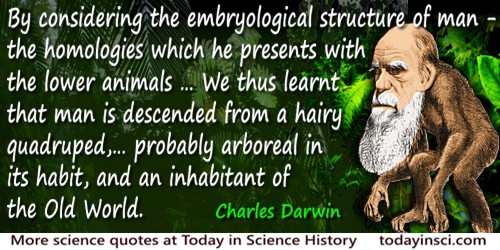
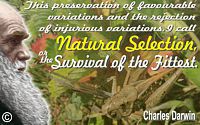
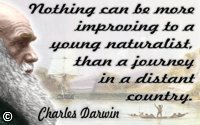
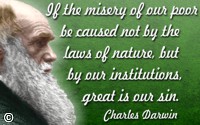
 In science it often happens that scientists say, 'You know that's a really good argument; my position is mistaken,' and then they would actually change their minds and you never hear that old view from them again. They really do it. It doesn't happen as often as it should, because scientists are human and change is sometimes painful. But it happens every day. I cannot recall the last time something like that happened in politics or religion.
(1987) --
In science it often happens that scientists say, 'You know that's a really good argument; my position is mistaken,' and then they would actually change their minds and you never hear that old view from them again. They really do it. It doesn't happen as often as it should, because scientists are human and change is sometimes painful. But it happens every day. I cannot recall the last time something like that happened in politics or religion.
(1987) -- 


